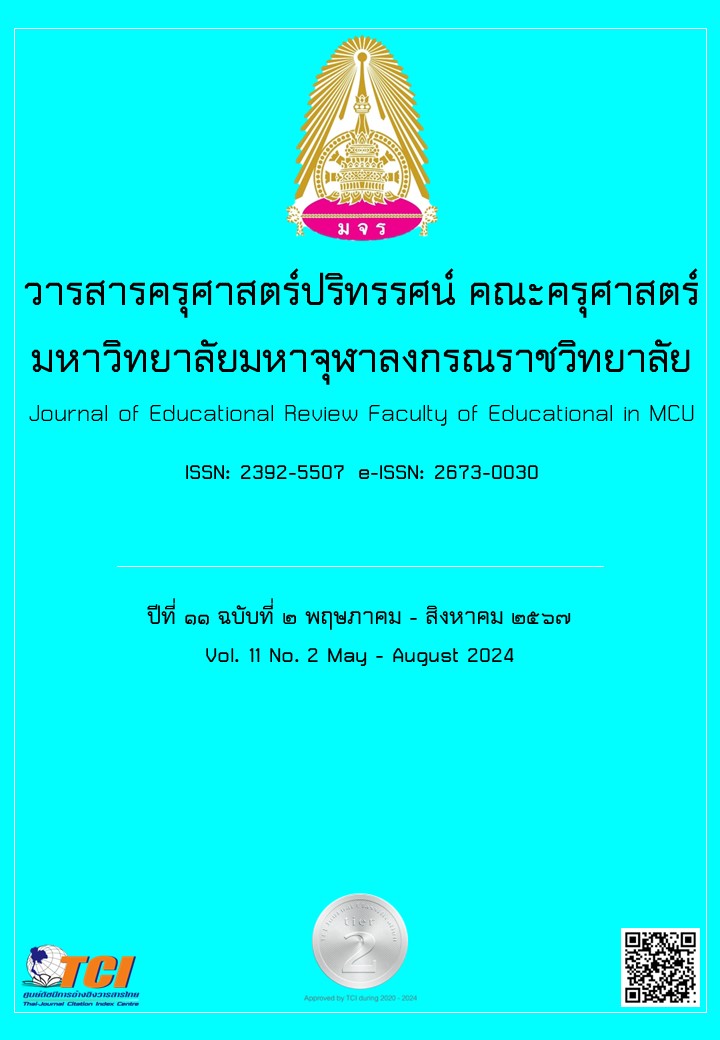THE PROCESS OF DEVELOPING LIFELONG LEARNING SKILLS IN THE 21ST CENTURY ACCORDING TO BUDDHIST PRINCIPLES FOR MONKS IN THE SANGHA ADMINISTRATION REGION 12
Main Article Content
Abstract
This research article aimed to 1) study the status of lifelong learning skills in the 21st century of monks in the Sangha Region 12, 2) develop a process for developing lifelong learning skills in the 21st century based on Buddhist principles, and 3) evaluate the process for developing lifelong learning skills in the 21st century based on Buddhist principles. This research was a mixed-method research. The quantitative research used a sample of 132 monks. The qualitative research interviewed key informants and organized focus group discussions with experts. The research instruments were questionnaires, interview forms, and focus group discussion manuals. The research data were analyzed by using frequency, percentage, mean, standard deviation, and content analysis. The results of the research found that 1) the status of lifelong learning skills in the 21st century of monks in the Sangha Region 12 was at a high level overall. 2) The process of developing lifelong learning skills in the 21st century based on Buddhist principles was at a high level. It was a process of developing lifelong learning skills integrated with the 4 Iddhip da: (1) setting learning goals, (2) selecting appropriate learning methods, (3) practicing activities, (4) evaluating learning outcomes, (5) learning indicators, and 3) the results of the evaluation of the process of developing lifelong learning skills in the 21st century according to Buddhist principles were at a high level overall. It could be used to develop lifelong learning skills in the 21st century with the 4 Iddhip da for monks in the 12th Sangha Administrative Region effectively.
Article Details

This work is licensed under a Creative Commons Attribution-NonCommercial-NoDerivatives 4.0 International License.
ทัศนะและความคิดเห็นที่ปรากฏในบทความในวารสารฉบับนี้ถือเป็นความรับผิดชอบของผู้เขียนบทความนั้นเพียงผู้เดียว และไม่ถือเป็นทัศนะและความรับผิดชอบของกองบรรณาธิการ
กองบรรณาธิการขอสงวนสิทธิ์ในการคัดเลือกบทความลงตีพิมพ์และจะแจ้งให้เจ้าของบทความทราบหลังจากผู้ประเมินบทความตรวจอ่านบทความแล้ว
ต้นฉบับที่ได้รับการตีพิมพ์ในวารสารครุศาสตร์ปริทรรศน์ คณะครุศาสตร์ มหาวิทยาลัยมหาจุฬาลงกรณราชวิทยาลัย ถือเป็นกรรมสิทธิ์ของคณะครุศาสตร์ มหาวิทยาลัยมหาจุฬาลงกรณราชวิทยาลัย ห้ามนำข้อความทั้งหมดหรือบางส่วนไปพิมพ์ซ้ำ เว้นเสียแต่ว่าจะได้รับอนุญาตจากมหาวิทยาลัยฯ เป็นลายลักษณ์อักษร
References
ชูเกียรติ ไชยทวีวิวัฒน์กุล. (2565). ทักษะการเรียนรู้ในศตวรรษที่ 21 (The Twenty-First Century Skills). แหล่งที่มา http://www.acn.ac.th/articles/mod/forum/discuss.php?d=435 สืบค้นเมื่อ 29 พ.ค. 2565.
นพมาศ ปลัดกอง. (2562). การพัฒนาการเรียนรู้ด้วยการนำตนเองของผู้เรียนในระบบการศึกษาทางไกล โดยใช้รูปแบบการจัดการเรียนรู้ด้วยเทคนิคนั่งร้านเสริมเรียนรู้. ดุษฎีนิพนธ์ปรัชญาดุษฎีบัณฑิต. มหาวิทยาลัยศรีนครินทรวิโรฒ.
นฤพันธ์ สมเจริญ. (2565). นวัตกรรมการเสริมสร้างการมีส่วนร่วมของเครือข่ายทางสังคม ตามหลักอารยธรรมวิถีสี่ครูบาในจังหวัดลำพูน. ดุษฎีนิพนธ์พุทธศาสตรดุษฎีบัณฑิต. มหาวิทยาลัยมหาจุฬาลงกรณราชวิทยาลัย.
ปรัชญา เวสารัชช์. (2545). หลักการจัดการศึกษา. กรุงเทพมหานคร: สำนักงานปฏิรูปการศึกษา.
พระพิพิธพัชโรดม (อำนวย อินฺทวณฺโณ). (2565). การพัฒนาการปกครองคณะสงฆ์ตามแผนปฏิรูปกิจการพระพุทธศาสนาของพระสังฆาธิการ จังหวัดเพชรบุรี. ดุษฎีนิพนธ์พุทธศาสตรดุษฎีบัณฑิต. มหาวิทยาลัยมหาจุฬาลงกรณราชวิทยาลัย.
มหาจุฬาลงกรณราชวิทยาลัย. (2539). พระไตรปิฎกภาษาไทย ฉบับมหาจุฬาลงกรณราชวิทยาลัย. กรุงเทพมหานคร: มหาจุฬาลงกรณราชวิทยาลัย.
มัทนา หาญสุริย์. (2563). การศึกษาบนโลกดิจิทัล. วารสารการบริหารการศึกษาและภาวะผู้นำ มหาวิทยาลัยราชภัฏสกลนคร. 8(31). 9-21.
รุ่ง แก้วแดง. (2543). ยุทธศาสตร์การเรียนรู้ตลอดชีวิตในศตวรรษที่ 21: สหราชอาณาจักร. กรุงเทพมหานคร: สำนักงานคณะกรรมการการศึกษาแห่งชาติ.
วิจารณ์ พานิช. (2555). วิถีสร้างการเรียนรู้เพื่อศิษย์ในศตวรรษที่ 21. กรุงเทพมหานคร: มูลนิธิ สดศรี-สฤษดิ์วงศ์.


